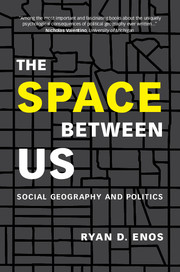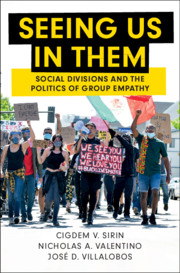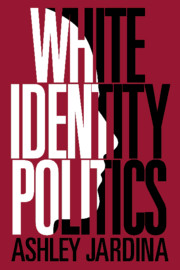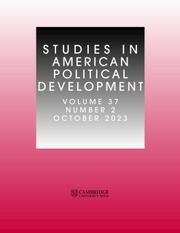The Space between Us
The Space between Us brings the connection between geography, psychology, and politics to life. By going into the neighborhoods of real cities, Enos shows how our perceptions of racial, ethnic, and religious groups are intuitively shaped by where these groups live and interact daily. Through the lens of numerous examples across the globe and drawing on a compelling combination of research techniques including field and laboratory experiments, big data analysis, and small-scale interactions, this timely book provides a new understanding of how geography shapes politics and how members of groups think about each other. Enos' analysis is punctuated with personal accounts from the field. His rigorous research unfolds in accessible writing that will appeal to specialists and non-specialists alike, illuminating the profound effects of social geography on how we relate to, think about, and politically interact across groups in the fabric of our daily lives.
- Presents new theory and evidence while synthesizing over eighty years of research across multiple fields
- Draws on evidence from important recent events, including the 2016 election, and evocative examples
- Takes a sophisticated mixed methods approach, including the use of laboratory studies and in-depth interviews
Awards
Co-winner, 2018 Best Book Award, Experimental Research Section, American Political Science Association
Reviews & endorsements
'The Space between Us forges important new ground in understanding one of the most vexing questions in modern political science, namely how social geography - the physical presence of people different from oneself - shapes political views and behavior. Ryan D. Enos’ cleverly designed experiments and analyses allow him to precisely isolate the effects of local context in ways that have eluded other researchers. … This book is a must-read with important methodological implications for how we study social geography as well as practical implications for politics and public policy in diverse societies.' Elisabeth Gerber, University of Michigan
'These marvelous studies of social geography, like all great social science, reveal the hidden forces that are too big or too small to see with the naked eye. Enos is a methodological omnivore of exceptional creativity and ambition who knocks it out of the park in study after study. From the housing projects of Chicago’s South side to the limestone walls of Jerusalem, Enos shows, with surgical precision, how our lives are unconsciously shaped by our arrangements on the surface of the Earth. This rigorous, insightful, and often poignant book will change how you see the world and your place in it.' Joshua Greene, Harvard University, Massachusetts
'Ryan D. Enos charts new analytic territory in demonstrating the spatial foundations of political inequality. Not content to rest on traditional approaches, Enos sets a high evidentiary bar by conducting a rigorous set of original and creative studies - including both laboratory and field experiments - that show how social geography gets into our minds and ultimately shapes the public sphere. Methods designed to assess causality and social mechanisms are integrated with personal observations and descriptions of everyday life in the divided cities that still characterize America. On the evidence presented, researchers and policymakers should reject the common idea that geographical space is merely a container for action and confront that it is instead a driver of political life.' Robert J. Sampson, Harvard University, Massachusetts
'In this lucid and deeply original book, Enos demonstrates the profound consequences of separation on politics, not just in America but in any segregated society. Using basic, well-established features of human psychology as his foundation, he provides a compelling alternative to narrow conceptions of political behavior as a simple matter of material self-interest, and draws a richer portrait of the ways that space, geography, and group allegiance affect the way we think and vote.' Dylan Matthews, Senior Correspondent, Vox.com
'Among the most important and fascinating books about the uniquely psychological consequences of political geography ever written. Enos’s theory is not about the somewhat narrow consequences of rather intimate, interpersonal contact, but about the impact of sharing geographic space with strangers of a different race. His theory … comes to some less than optimistic predictions about our ability to live in harmony within densely populated but racially segregated places like most major cities around the world. His evidence from a variety of sources - lab experiments, natural experiments, and observational studies - supports the notion that close contact combined with segregation along racial, ethnic, or religious lines powerfully undermines support for policies that might benefit groups other than our own. It is sobering news, but perhaps now that he has uncovered the causes we can begin to imagine more effective ways forward.' Nicholas Valentino, University of Michigan
‘From a perspective that considers geography, psychology, and politics, this book offers a fascinating comparative case-study approach to examining the reasons different groups of people remain separated, though they live in close proximity.' A. E. Wohlers, Choice
'The book is very accessible, written in an easy style with personal exemplars used to illustrate the main arguments. … [T]his is an important book. Those who contributed ‘puffs’ for its back cover are lavish in their praise, and rightly so. The research reported, based on firm theoretical foundations, moves contextual analyses significantly forward and is attractively presented. It should be widely read, cited and extended by researchers in a broad range of fields.' Ron Johnston, Urban Studies
'The reader is left with the sense of having watched a master artisan at work. Even if preliminary guidelines, drawn to establish accurate perspective, may initially seem overly technical representations for the mess of social life, after Enos’s diligent layering of detail and definition, the picture that emerges changes the way you view the real world. Enos has made the space between us a necessary consideration for understanding interaction and cooperation in diverse social landscapes.' David J. Amaral, Journal of Urban Affairs
Product details
October 2017Hardback
9781108420648
314 pages
235 × 158 × 19 mm
0.64kg
Available
Table of Contents
- 1. The red line
- 2. The demagogue of space
- 3. The demagogue's mechanism: groups, space, and the mind
- 4. Laboratories: assigning space
- 5. Boston: trains, immigrants and the Arizona question
- 6. Chicago: projects and a shock to social geography
- 7. Jerusalem: walls and the problem of cooperation
- 8. Crenshaw Boulevard, Los Angeles: contact and exit
- 9. Phoenix: the arc of intergroup interactions and the political future.








